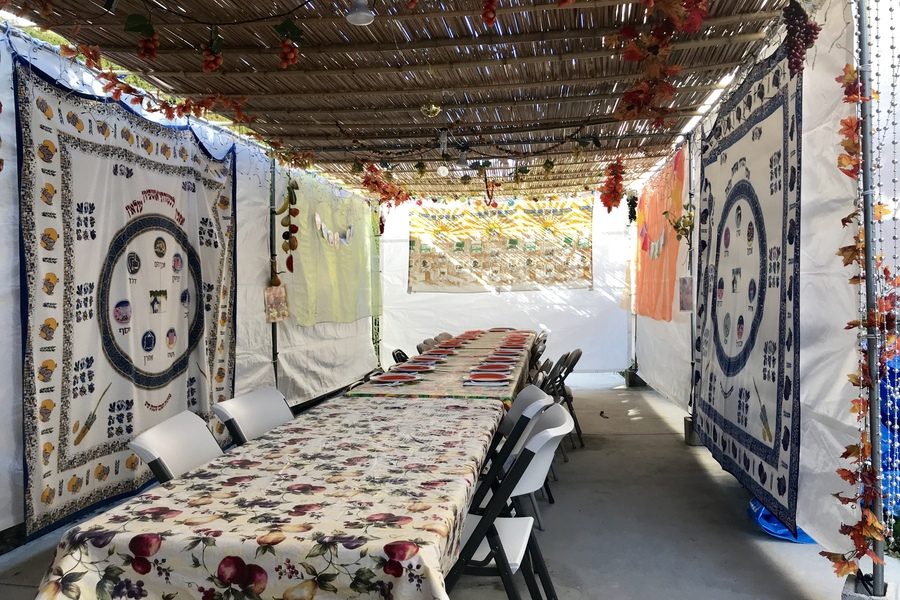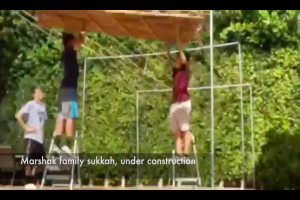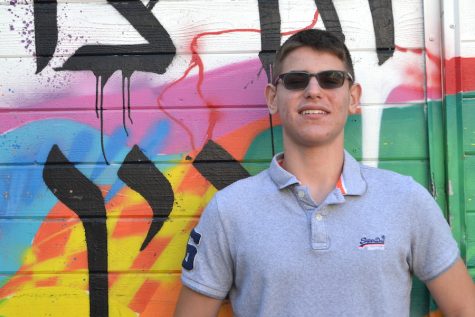Slumbering in the sukkah?
October 11, 2017
The Gemara in Masechet Sukkah (Sukkah 28b) explains that the requirement to dwell in the sukkah during Sukkot is to make it a temporary home, which includes performing all activities that are normally done in the house in the sukkah instead.
Sleeping is an activity normally done in the house. But an informal survey of about 30 Shalhevet students and staff found no one who sleeps regularly in the sukkah during Sukkot, even though the weather in Los Angeles is almost always delightful.
So why do so few people actually sleep in their sukkahs? Simply put, today’s generation is very fussy about sleeping accommodation, so sleeping in the sukkah is too rustic an experience for many tastes.
“It’s an inconvenience to sleep in the sukkah,” said sophomore Natalia Shabtay, adding that fear .of her younger brother and sister getting sick also keeps her family out of the sukkah at night.
“It gets cold, it’s uncomfortable, and it’s hard to sleep in.”
Freshman Maya Vaakil said worry about being exposed to animal and human trespassers makes her feel unsafe in the sukkah, so she opts to sleep inside.
“You have more security inside in your house than you do outside in your sukkah,” said Maya.
The mitzvah of l’eishev b’sukkah — “dwelling in the sukkah” — is found in Parshat Emor in Vayikra (Leviticus). In chapter 23, verse 42, God commands the Jews, “In sukkot [huts] you shall dwell for seven days.” This year the holiday runs from October 4th through October 11th.
Despite all the reasons people have against sleeping in the sukkah, some are in favor of it. One is sophomore Ari Schlacht — but only when the weather is good.
“Two years ago,” Ari said, “we were looking forward to sleeping in the sukkah, but it started to drizzle, and fearing a downpour, we decided to move indoors.”
Senior Noa Segal occasionally sleeps in the sukkah for enjoyment, even though the commandment to “dwell” there doesn’t apply to her. According to the Mishna in Masechet Sukkah (Sukkah 28a), women are exempt from the positive commandment of l’eishev b’sukkah because it is time-bound.
“It’s really more of a do-it-when-I-feel-like-it kind of thing,” she said in an interview, noting that she does not have an obligation as a woman to do so.
The Shulchan Aruch 640:2 explains that even though women are exempt, they still have the option to dwell in the sukkah, and may recite the blessings as well.
Junior Yakir Kanefsky said that even though he does not have the specific custom to sleep in the sukkah, he still enjoys it when he does.
“I sleep in the sukkah sometimes in the spirit of Sukkot,” said Yakir, “but my decision is purely spontaneous.”
But Ari, Noa and Yakir are still in the minority.
Members of the Chabad community have a long-standing custom not to sleep in the sukkah. One is Rabbi Moshe Kesselman, who is the Rabbi at Shaarei Tefila Congregation in Los Angeles,
Rabbi Kesselman says that his custom, which he admitted was controversial, is based on the belief that despite the Torah commanding us to “dwell in the sukkah,” the sukkah is too holy to sleep in.
“The great Chassidic rabbis,” Rabbi Kesselman said in an interview, “felt very wrong to be sleeping in the presence of such a holy mitzvah, and because of this feeling of discomfort, they moved into their homes.”
Rabbi Kesselman said that even if he were a guest of someone who does sleep in the sukkah during Sukkot, he would still ask for arrangements to be made to sleep inside.
Like Rabbi Kesselman, Rabbi David Block, Judaic Studies teacher at Shalhevet said he doesn’t sleep in the sukkah, but for a different reason.
Rabbi Block said he slept in the sukkah before he was married. Since his marriage, he and his wife have adopted the custom of married couples in his family not to sleep in the sukkah due to shalom bayit, which means “peace of the home” — an aspiration that is given high priority in Jewish thought.
But he has fond memories of when he did.
“I really believe that if a person can do it, it’s a wonderful thing,” Rabbi Block said.















